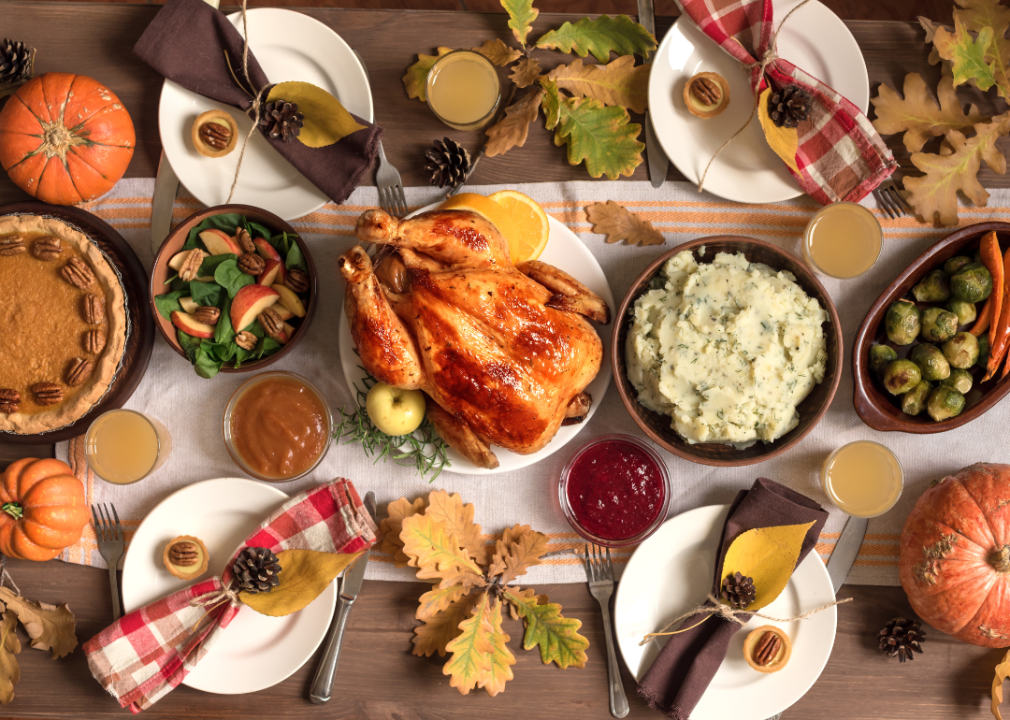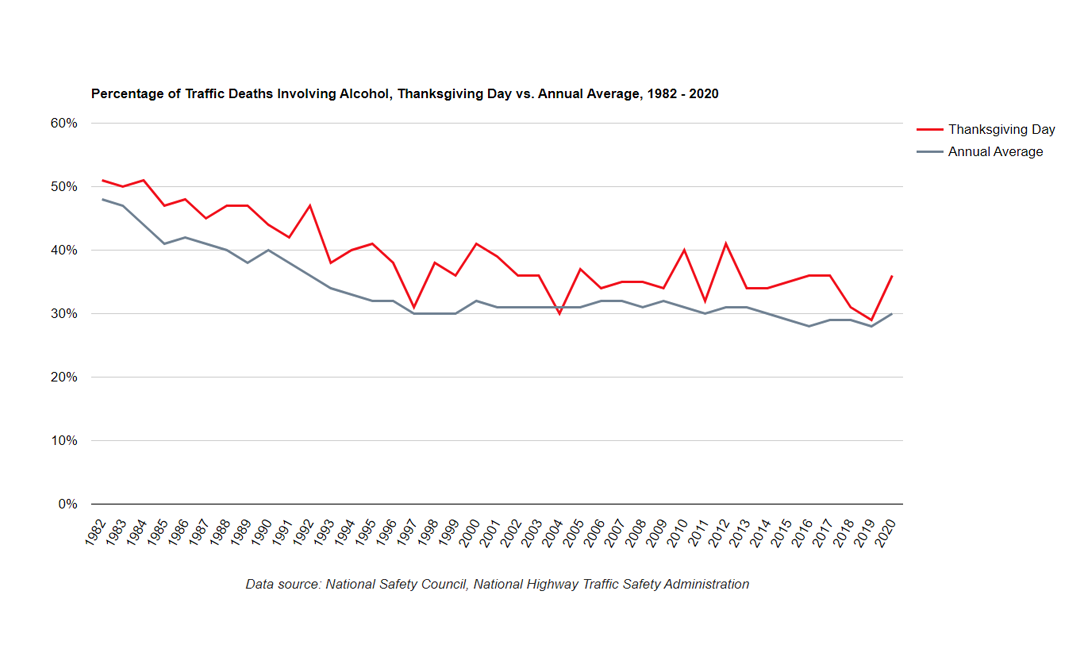Is it safe to drive after eating Thanksgiving turkey?

Canva
Is it safe to drive after eating Thanksgiving turkey?
A Thanksgiving meal laid out on a wooden table
Around the U.S. each November, Thanksgiving is marked by people getting together with friends and family and enjoying a festive meal. For many, turkey is a central component of that meal. The traditional centerpiece of the Thanksgiving meal has a long and widely held reputation for bringing down the energy levels of those who consume it, and promoting the urge to hit the couch for a post-meal nap.
But just as traditional to Thanksgiving as turkey is the use of cars to get people to and from wherever they are celebrating. Each year, traffic spikes around the country as nearly 50 million people take to the highway to travel throughout the long weekend.
With the elevated number of cars on the road during the Thanksgiving holiday, Automoblog wanted to see if the reported effects of turkey consumption make it more dangerous to drive. And while it doesn’t appear that eating turkey on its own can significantly impair one’s driving ability and make it more likely to get into an accident, there are still very real factors related to holiday meals and celebrations that substantially increase the chances of a deadly collision.
The sort-of-true myth of tryptophan
The idea that eating a holiday-sized helping of turkey can induce a state of sleepiness is a common trope. This drowsiness-inducing poultry property is attributed to the presence of tryptophan, an essential amino acid.
Tryptophan functions as a precursor to several compounds, including the neurotransmitters serotonin and melatonin. Consumption of tryptophan has been observed to lead to drowsiness and related symptoms in scientific studies.
A meta-study published in 1983 titled “Effects of L-tryptophan on sleepiness and on sleep” examined the results of more than 40 studies over a 20-year period. It determined “[t]he weight of evidence indicates that L-tryptophan in doses of 1 g or more produces an increase in rated subjective sleepiness and a decrease in sleep latency (time to sleep).”
However, while tryptophan consumption has been linked to an increase in sleepiness, that doesn’t mean that the turkey is the only – or even primary – culprit on the plate for the post-meal sedation many people report feeling.
For starters, the amount of tryptophan in a typical 3-ounce portion of turkey – 250 to 310 milligrams – falls well short of the 1-gram dose cited in the meta study. Taking seconds or even thirds of the bird still isn’t enough to reach the amount used on test subjects.
Turkey also isn’t the only thing on the table that contains tryptophan. The compound is present in nearly all proteins – in fact, chicken has a higher concentration of tryptophan than turkey. In short, tryptophan can induce a state of drowsiness and turkey does contain tryptophan, but not enough on its own to make it responsible for the sleepy feeling that sometimes follows the holiday meal.
Feeling drowsy after a big meal? It’s not (just) the turkey’s fault
We’ve established that the levels of tryptophan in turkey aren’t enough on their own to make you drowsy. However, that doesn’t mean that Thanksgiving dinner won’t leave you ready for a snooze. While the turkey specifically won’t mean you’re destined for the couch, eating a meal – and especially a large one – absolutely can.
According to a blog on non-profit library JSTOR, the main couch-inducing culprit is insulin. Eating food produces a rush of insulin in the body, and larger meals produce more insulin.
Insulin affects several receptors in the hypothalamus, a part of the brain that controls nervous and endocrine system functions. Among those is the production of orexin, a neurotransmitter that is believed to serve as a stimulant and affect wakefulness. Studies have shown that the presence of insulin can inhibit the production of orexin, and therefore a person’s alertness.
It is this rush of insulin that occurs after eating that can make a person feel drowsy or sleepy, according to the article, which says:
“As it happens, orexin neurons in the hypothalamus are inhibited by insulin. The bigger the meal, the more glucose there is in the blood, more insulin is produced, which reduces the production of orexin. Lethargy ensues.”
However, this response is common to any meal, not just Thanksgiving. While lethargy may indeed ensue after the holiday meal, that meal on its own shouldn’t make drivers substantially more sleepy than any other meal. This means that, following a few helpings of turkey, drivers can most likely exercise just the same levels of caution as they would after a normal dinner.
![]()

Automoblog
The real danger is any alcohol you might consume with dinner
A line graph showing Percentage of Traffic Deaths Involving Alcohol, Thanksgiving Day vs. AnnualAverage, 1982 – 2020
You may indeed find yourself a little sleepy after chowing down on turkey, stuffing, cranberry sauce, and other Thanksgiving meal classics. But neither the turkey nor the sizable portions of foods you might consume are likely to leave you muddled to the point of interfering with your motor or cognitive skills.
However, something else that diners commonly pair with that meal irrefutably can. Alcohol is a part of the holiday meal for many people. And while it may help some get into the holiday spirit and feel more comfortable around company, it is also the single leading cause of automobile deaths.
According to data from the National Highway Traffic and Safety Administration (NHTSA), alcohol played a role in 97,597 traffic fatalities between 2012 and 2021 – nearly 30% of all traffic fatalities. That translates to an average of 39 alcohol-related traffic deaths every single day, or one every 37 minutes.
Consuming alcohol and driving substantially increases the risk of an accident at any time of year. But during the holidays, the risk is even greater. The increased probability of accidents when alcohol is involved, combined with a higher number of vehicles, means that – by sheer number – the number of accidents is almost certain to go up.
However, according to NHTSA data, alcohol plays a factor in even more accidents during Thanksgiving than during other times. During non-holiday times, the NSC observed that alcohol played a role in an average of 34% of fatal accidents between 1982 and 2020. That average rate climbs to 39% during the Thanksgiving holiday.
With already-elevated risk during Thanksgiving, don’t make it worse
Driving is inherently risky at any time. An average of 41,528 people died in automobile accidents each year in the U.S. between 1990 and 2021. The NSC found that an average of 115.4 people die in an automobile accident per day during the Thanksgiving holiday – slightly more than the average non-holiday day and even more than during Christmas or New Year’s holidays.
Your best bet is to avoid the roads entirely if possible. But for people who are taking the opportunity to gather with loved ones, other modes of transportation, like flying or rail travel, may just not be realistic in a country built around the use of private cars.
If you must drive during the long Thanksgiving weekend, the science says it’s probably OK to fill up on turkey before doing so. Even so, if you do feel drowsy after downing dinner, it’s good to trust your judgment and wait until you feel alert enough to deal with the increased risk of holiday driving.
However, if you decide to mark the occasion with a drink or two, your judgment shouldn’t come into play. There is simply no reason to get behind the wheel after drinking and risk your ability – or that of others in your car or on the road – to relish a few servings of turkey with family and friends next year.
This story was produced by Automoblog and reviewed and distributed by Stacker Media.
